
Working with multiple high-traffic websites, employing numerous large-scale applications, agencies have to be able to level up their hosting performance at speed while not sacrificing performance or control. Virtual Private Server (VPS) hosting is stepping in to cater for this growing agency need, to fill the space between shared hosting and dedicated servers.
Evolve with Growth: Hosting Needs
No agency today works with static sites and small-sized databases. In most cases, agencies are working on multiple client projects that contain dynamic content, resource-intensive plugins, and complex workflows. Shared hosting may be the most budget-friendly option in the short term, but shared hosting services lack the optimizations for this kind of work.
Agencies in the process of rethinking their infrastructure can consider reliable VPS hosting solutions for digital agencies that deliver dedicated performance without the high cost of traditional servers VPS is hosting in the middle—a dedicated performance machine with scaling abilities for growing agencies.
Traditional Hosting: Where It Falls Short
Shared hosting can be a viable starting point, but it introduces limitations that become apparent as workloads increase. Bandwidth caps and resource contention often result in sluggish site performance during peak traffic. Worse, a traffic spike or technical issue on one site within the shared environment can affect all others on the same server.
Additionally, shared hosting offers little room for customization. Developers working on tailored client solutions are constrained by standard server configurations. This lack of flexibility can hamper both innovation and security.
VPS Hosting: Why It’s a Better Fit for Agencies
A VPS provides dedicated resources—CPU, RAM, and disk space—that are isolated from other users. This ensures more stable performance and greater reliability across projects. Agencies can configure their environment to suit the specific needs of each client, whether it’s deploying a Laravel backend, scaling a WordPress multisite network, or implementing security protocols.
Full root access gives development teams the freedom to install custom libraries and modify server settings. Moreover, because each VPS operates in a sandboxed environment, security risks from other users on the same physical server are significantly reduced. This level of isolation is particularly vital when managing sensitive client data or building compliance-friendly infrastructures.
Real-World Agency Scenarios
If an agency manages ten client websites, each with its own performance needs and plugin dependencies, a single script issue on a shared server could bring every site down. On a VPS, each website is neatly contained in its own virtual environment, ensuring that no other website can interfere with its operation.
Agencies can easily repurpose their already dedicated VPS environment for the hosting of staging and development sites. For example, a development firm that builds custom web apps for e-commerce companies can spin up multiple development or staging environments on the same VPS to test each site without affecting one another or existing client sites. This development process will save agencies time and energy as well as reduce client risk.
Finally, hosting with VPS will allow agencies to unify the administration of DNS, SSL certificates, and backups. By having everything under one roof, they reduce the amount of manual work and troubleshooting, making it easier for themselves when delivering their service.
The Right VPS Host
Every VPS host is different, but agencies have unique requirements: fast and responsive customer service, the ability to rapidly scale resources, and a high degree of guaranteed uptime. Agencies also need management interfaces that account executives can quickly grasp and that developers can customize to create bespoke deployments.
Agencies prefer hosts with a simple, easy-to-understand billing structure. This is important because attempting to plan client infrastructure when overage fees and add-ons significantly impact total costs creates unnecessary complications. This is in addition to well-documented support plans, upscaling options, and clear resource constraints, which in turn make capacity planning and client onboarding easier.
Conclusion
As the number and scale of infrastructure concepts continue to grow for digital agencies of all sizes, traditional hosting is now more likely to be a hindrance than a help. VPS hosting offers a stable, flexible, and scalable alternative for agencies.
Choosing the right provider today will help a digital agency build better, stronger, faster and more stable experiences for clients, setting up the company for growth and future scalability as they continue to invest in better client work.




